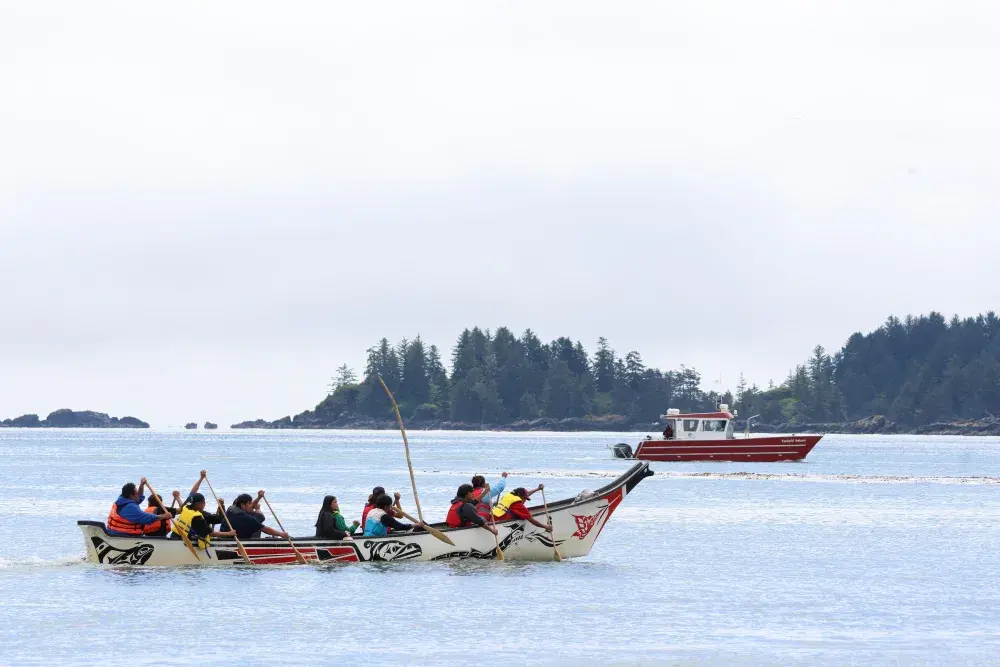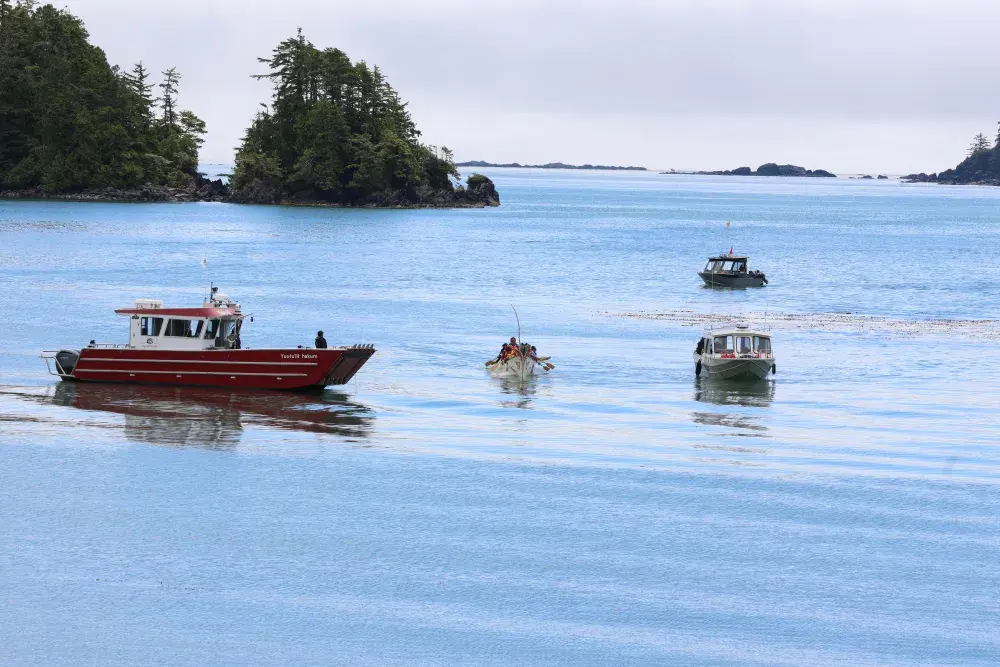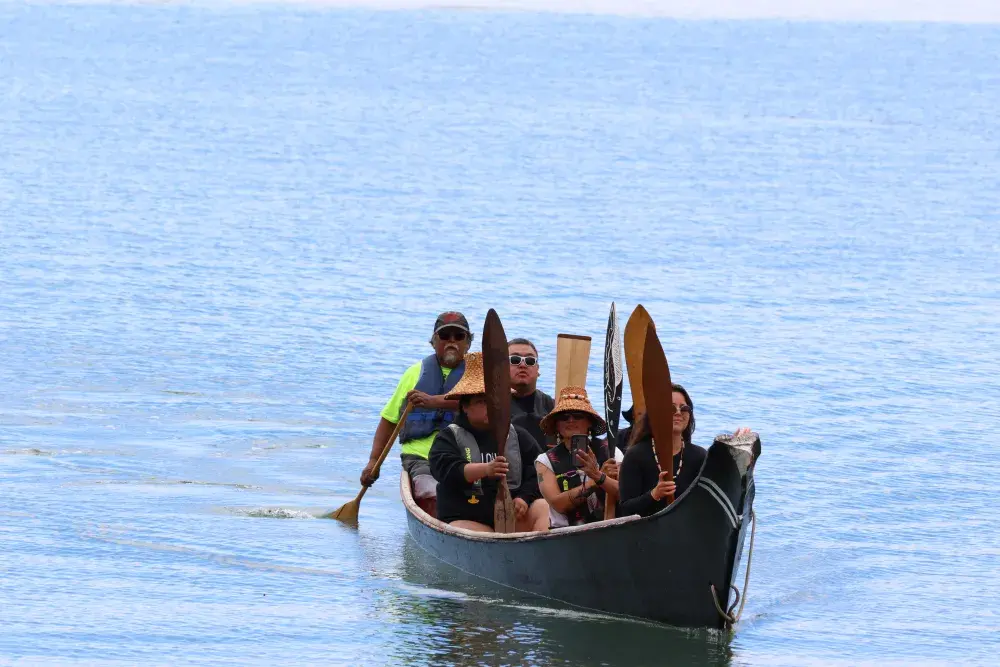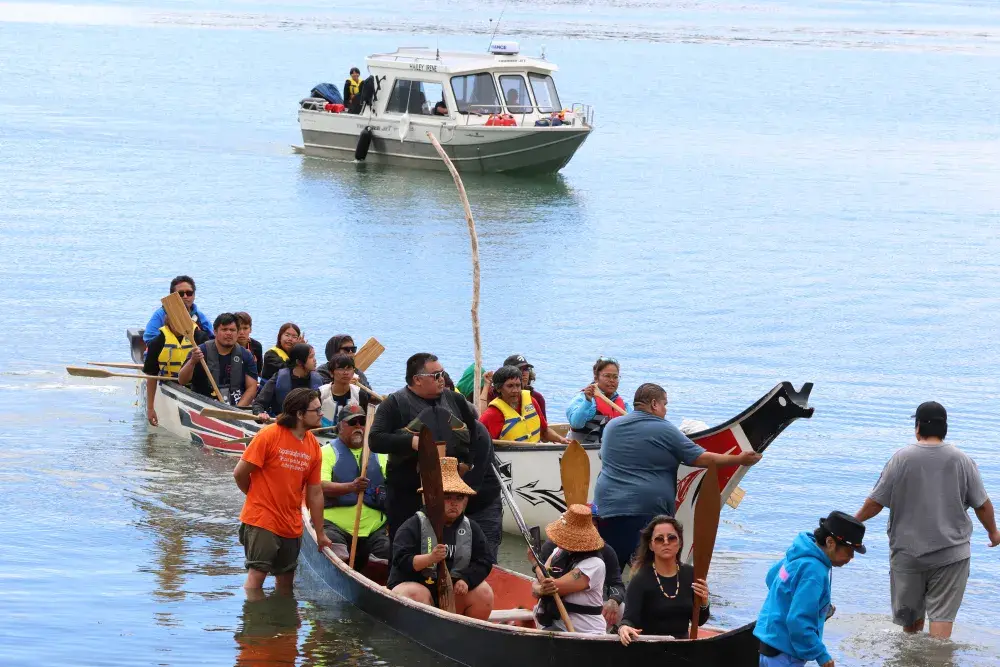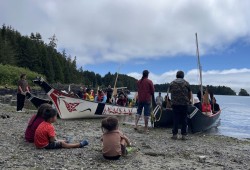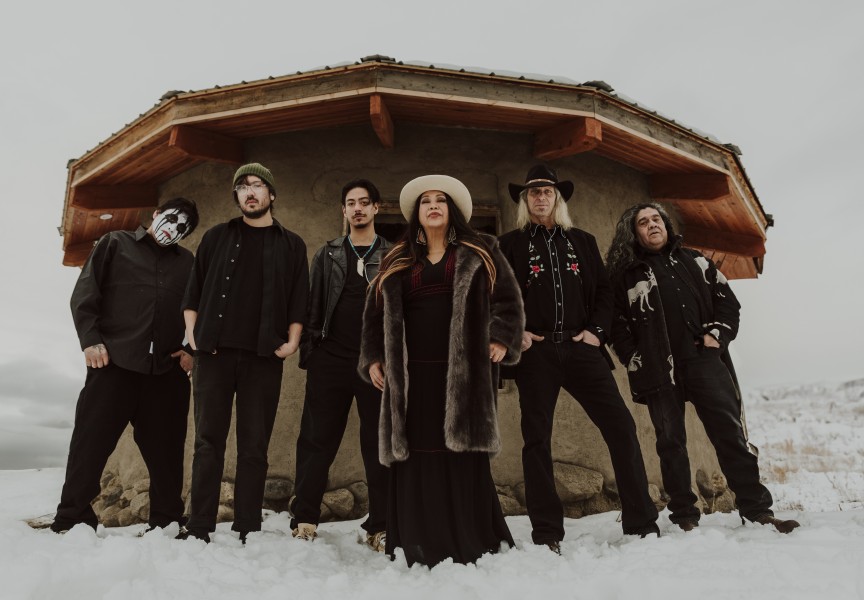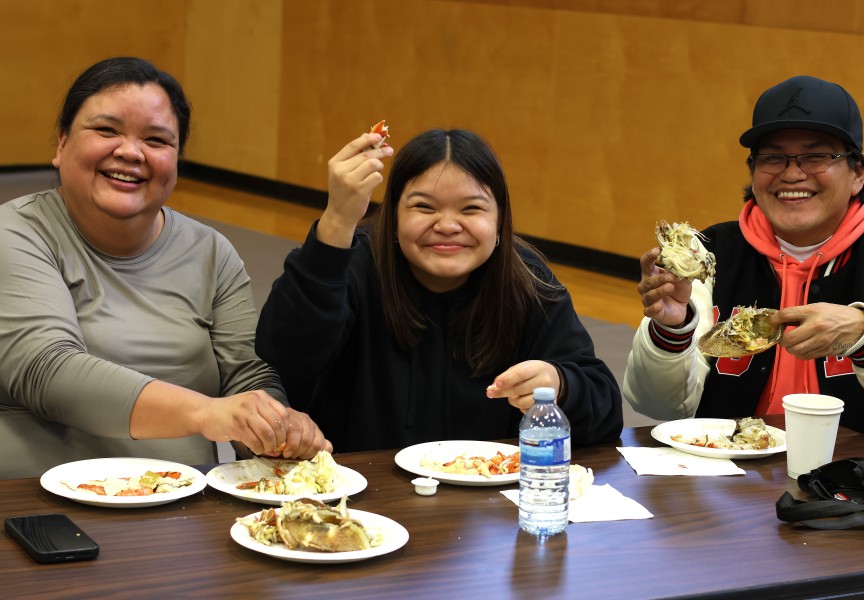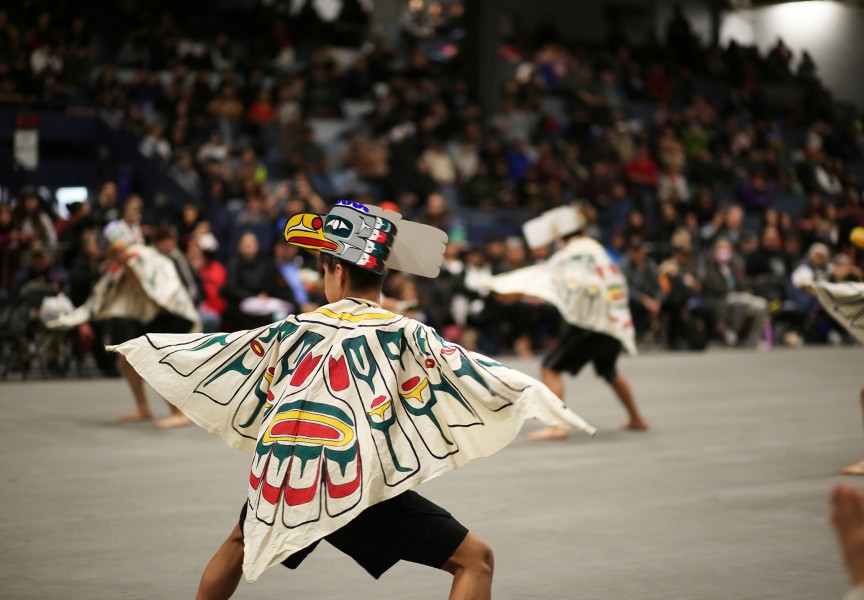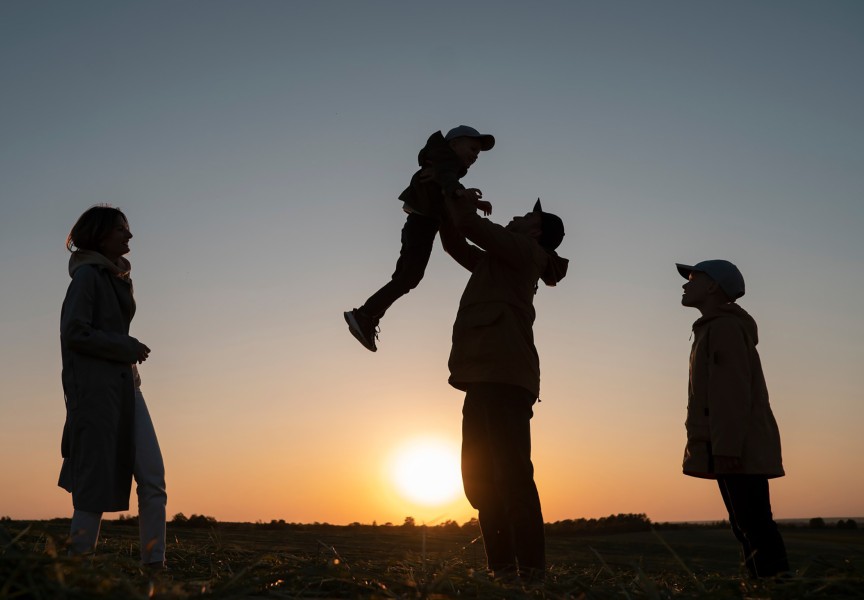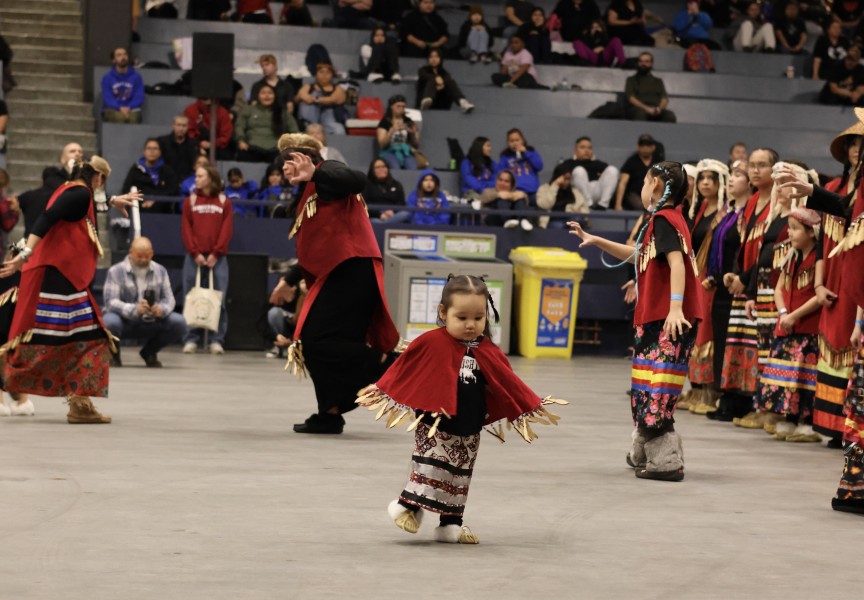After a 7:30 a.m. push off from Long Beach on July 23, three Ahousaht canoes and one Hesquiaht canoe cruised into the Yuułuʔiłʔatḥ (Ucluelet First Nation) community of Hitacu around 1 p.m.
On their way to Hitacu Hesquiaht skipper Vince Ambrose said his crew of mostly women hugged the shoreline while the other Ahousaht canoes went offshore.
“It was easy pulling. There was no wind. The ocean was pretty calm,” said Ambrose on day four of a 12-day canoe journey.
Their destination is to reach the Elwha Klallam Tribe by July 31 for a Potlatch with over 100 tribal canoe families from all over the Pacific northwest.
“We are tired. It’s been a long pull from Hesquiaht, our number one reserve, to Hot Springs,” said Ambrose.
As part of the landing protocol, one member from each canoe asked for permission to come ashore to rest, share songs and food.
Yuułuʔiłʔatḥ community member Skylene Patrick welcomed the weary pullers to their territory and invited them to make themselves at home.
“We admire the traditional healing and work that your communities and nations are doing. The work that you are doing is tying you to the land, to the water, to our people,” said Patrick. “We aspire to be paddling a Yuułuʔiłʔatḥ cupac (canoe) alongside you one day.”
Yuułuʔiłʔatḥ had a canoe family preparing for the Paddle to Elwha journey, but Yuułuʔiłʔatḥ Government (YG) pulled their financial support two days before the crew was meant to depart citing “safety and liability concerns”.
In a July 23 letter, YG President Charles McCarthy stated that “due to concerns for the safety of Yuułuʔiłʔatḥ citizens and staff, the YG Executive has made the difficult decision not to sanction or endorse this year’s event.”
“I’m angry. What message is this sending to our children and youth? It’s not our way to focus on policy and procedure,” said Yuułuʔiłʔatḥ community member Anita Charleson-Touchie.
“Just knowing the devastation, I’ve watched many young people prepare for months. I’ve seen one of our teenagers making her way to the canoes at six in the morning and watched my son prepare paddles, he’s devastated. He’s heartbroken. I just know that it’s not right to withdraw on such a short notice,” she continued.
Charleson-Touchie, alongside dozens of other Yuułuʔiłʔatḥ citizens, made it down to the beach to welcome the other nations, despite the last-minute news from their own government.
“I’ve been raised with the values of help one another. That’s why I came. I want to be a good host,” said Charleson-Touchie. “It’s deflating for sure. We will take care of our guests and do what we can. What’s resonating is the teaching of late Richard Mundy who always reminded us that we come from a loving people and that’s what I’ll hold in my heart.”
Sam Chester, who is of Ditidaht First Nation and Keltsmaht descent, spoke on behalf of the ‘Flying Monster’ canoe family from Ahousaht.
“We consist of paddlers from all different nations. We even have a Mohawk with us,” said Chester.
“Journeys is a lot of things to a lot of people. A lot of people do it for different reasons. A lot do it to deal with drugs and alcohol and loss of a loved one and strengthen themselves and grasp life back. A couple of the girls with me, they lost their mother, so they come to heal,” he shared.
Nitanis Desjarlais watched her son Cheveyo Seitcham, 15, ask for permission to come ashore in Hitacu.
“He’s going all the way. His older brother gave up his seat and he will be on the land crew. He just jumped on,” said Desjarlais, adding that she’s been scrambling to round up camping gear.
Ahousaht is sending three canoe families and one youth canoe to Elwha this year.
“This means a lot to us. Physically being on the ocean, there is so much healing. It’s not the ocean that separates us, it’s the ocean that connects us. Through the ocean highways connecting our communities in a cultural way is the best feeling,” she said.
One of the Ahousaht canoes and support boats were blessed with a visit from kakawin (killer whales) on the pull from Long Beach to Hitacu.
“This will be lifetime transformable memories that is going to connect them to their nation,” said Desjarlais. “That cultural pride and that DNA memory being activated is really going to set some solid foundation for them.”
Ahousaht member Daniel Frank, 61, is on a support boat for his nephew Russell Frank Jr. He will follow the Ahousaht youth boat to Elwha.
“I did it for sobriety,” says Frank of his past Tribal Journey to Lummi. “There is no drinking allowed. It’s better than being out drinking.”
The next stop for the Hesquiaht and Ahousaht canoe families is a night at the Broken Group Islands then they will continue on to Huu-ay-aht First Nations traditional territory.
“After Huu-ay-aht there are going to be three really long pulls. Ten-hour days. We’re hoping for good weather. My hands are fine. I’ve been fishing, so I have callouses,” said the Hesquiaht Hereditary Chief Vince Ambrose.

